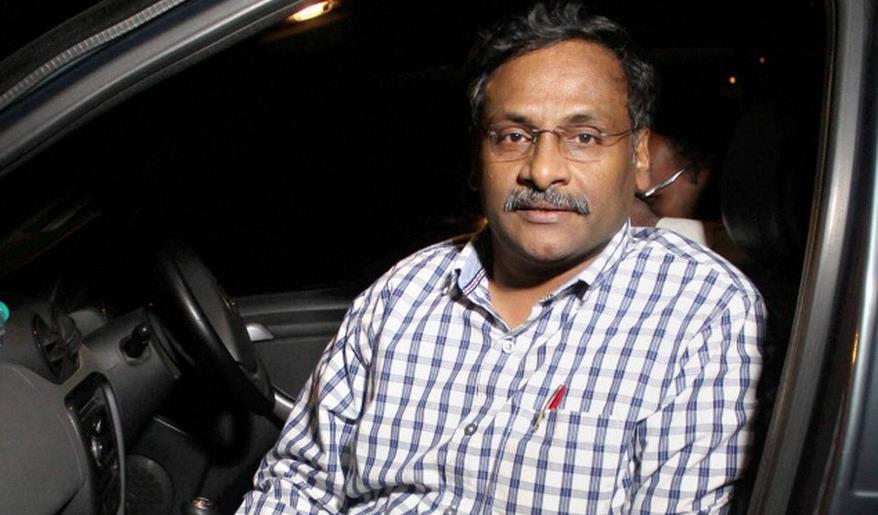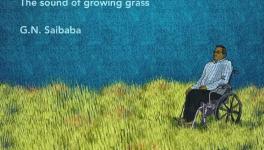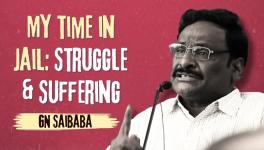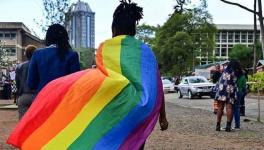Neither Executive nor Legal System, Saibaba Got (in)Justice in Death

Image Courtesy: PTI
Neither the judiciary nor the executive, natural justice resulted through his death.
Professor GN Saibaba’s long trial and incarceration will be ‘historical’, as it was not only a tragedy but a criminal act. It led to his relentless decade-long pursuit to be liberated from prison. This is against all principles of the Constitution and established criminal law.
This case shows the huge costs of India’s legal and carceral systems on many like Saibaba. In a different fora, the late professor had explained: “Prisons reflect how timely justice is completely missing, as a result, the fundamental rights guaranteed under the Constitution are violated. Unless you have fundamental rights guaranteed, you cannot move towards democratic rights.”
How then is it possible to ensure justice? We can be surely happy for justice at the Supreme Court’s judgment, but is that enough?
The Supreme Court rescued Saibaba from prolonged incarceration. The Nagpur bench of the Bombay High Court, for the second time in two years, acquitted him, ending the 90% disabled professor’s 10 years in custody, much of which was in solitary confinement.
But that did not end with Saibaba’s acquittal, as it was again appealed within a few hours and his fate once again brought him to the Supreme Court.
Luckily, on March 11, 2024, the apex court refused to stay his acquittal, as the bench emphasised that the lower court judgment was “well-reasoned”. This facilitated the release of Saibaba, as the prosecution did not make a special application to stay his acquittal this time.
A weak case, and a decade of ‘vague allegations’
Thanks to the bench of justices Vinay Joshi and Valmiki S.A. Menezes, in their acquittal judgment, apart from “vague allegations” of conspiring to wage war against the government, no tangible material to establish any “preparatory act” for conspiracy was found.
The judges also noted that the mere finding that the accused were acquainted with each other, and the fact that the alleged terrorist act was “not spelled out” proved a weak case for the prosecution. Despite this clear-cut observation, over the last decade, Saibaba’s trial had dragged its feet, often coming to unceremonious halts, painting an ominous picture of terror litigation in India.
A Bombay HC Bench
On October 14, 2022, a Division Bench of the Bombay High Court had first acquitted Professor Saibaba and five others. It noted that because the sanction to proceed with the case was granted after the conviction of proceedings had begun, the entire conviction by the trial court, and the subsequent sentencing for life imprisonment in 2017, was “null and void.”
This acquittal had come as a huge relief. Vasantha Kumari, Saibaba’s wife, said that apart from suffering from chronic conditions inflicted by diabetes and hypertension, he had suffered an internal injury during the time of his arrest, causing a form of paralysis in his left arm. But, the happiness of the release order did not last long.
‘Urgency’: Maharashtra Goes to SC
The Maharashtra government, within hours, challenged the High Court’s order before the Supreme Court. It was turned into an absurd pursuit of urgency. Solicitor General Tushar Mehta first tried mentioning the matter before Chief Justice U.U. Lalit’s bench, but the court had concluded proceedings for the day. Mehta then approached Justice D.Y. Chandrachud’s bench. Here also, the request to stay the High Court order was rejected, but he was allowed to apply for an early hearing before the CJI. The bench said they could list the matter on Monday, but explicitly noted that even if they were to hear the case on Monday, they would not be staying the acquittal order.
It was a special Saturday hearing, presided over by Justices Bela Trivedi and M R Shah. Only two judges were available to hear the arguments on the matter. “The absurdity of the Saturday hearing was the urgency,” said Senior Advocate Mihir Desai who represented Professor Saibaba before the Bombay High Court. He said, “Even if you had released him for two days, would he have run away? He is a senior gentleman, 90% disabled.”
The observation of SC about the High Court’s judgment was very important. The SC said that the High Court had erred in focusing solely on the procedural errors and hence had incorrectly ignored the merits of the case. The SC asked a new High Court bench to hear the case based on its sanction and merits.
The Supreme Court bench, in their comments, said that a person’s “brain” was the “most integral part of committing terrorism-related offenses.” A mere house arrest for a disabled senior citizen, such as Professor Saibaba, was not good enough. He was sent back to prison. Even as Senior Advocate R. Basant for Saibaba proposed to cut all phone lines to his residence, the High Court Order was stayed. Is this not a serious unconstitutional act?
‘Absurdity’
Senior Advocate Mihir Desai said: “Ultimately, everybody has a right to conscience, believing something without acting on it cannot be a crime. Belief is never criminalised under the law.”
Desai told this writer that even if one ignored the circumstantial absurdity of the Saturday hearing, the Order that came out of it was more legally baffling.
“I had never before come across something like this,” he said. “How can you stay an acquittal? The State put forward its standard arguments for national security. No matter what the merits were, these arguments were accepted.”
It was found that the case was frivolous on merits.
The point that needs to be understood is who will end this kind of injustice. The justice process made him suffer in prison and finally made him die without asking for justice. This is the real tragedy.
The writer is Professor, School of Law, Mahindra University, Hyderabad. The views are personal.
Get the latest reports & analysis with people's perspective on Protests, movements & deep analytical videos, discussions of the current affairs in your Telegram app. Subscribe to NewsClick's Telegram channel & get Real-Time updates on stories, as they get published on our website.
























